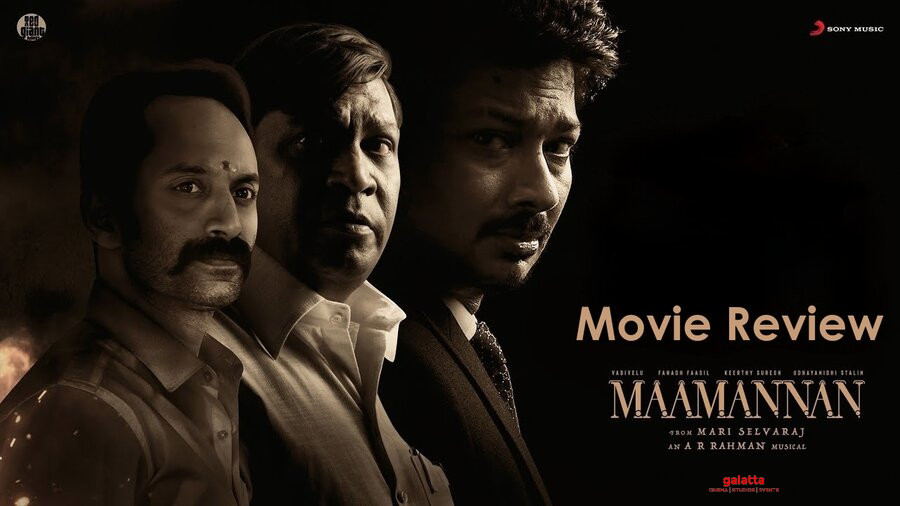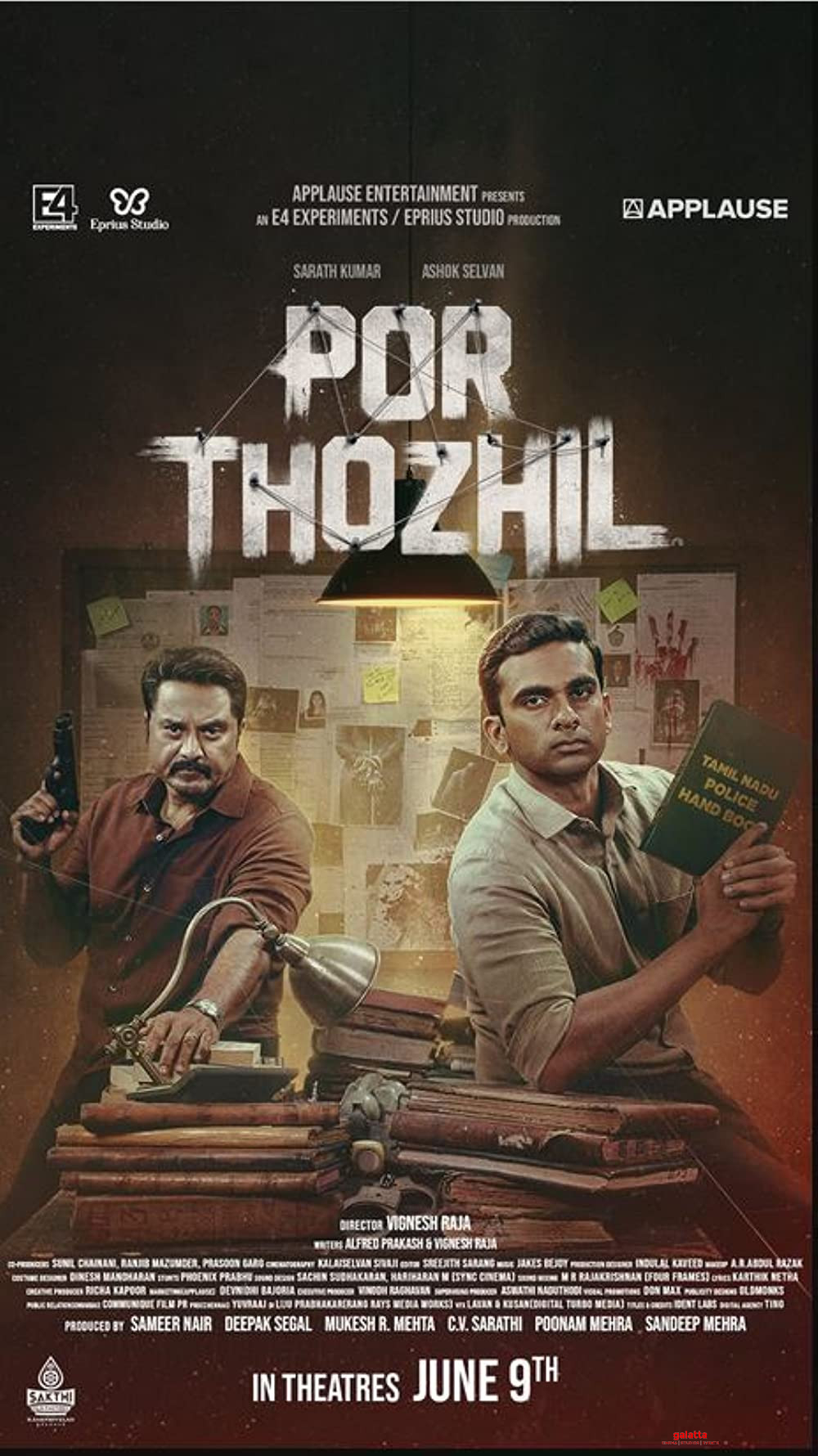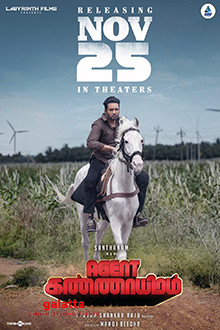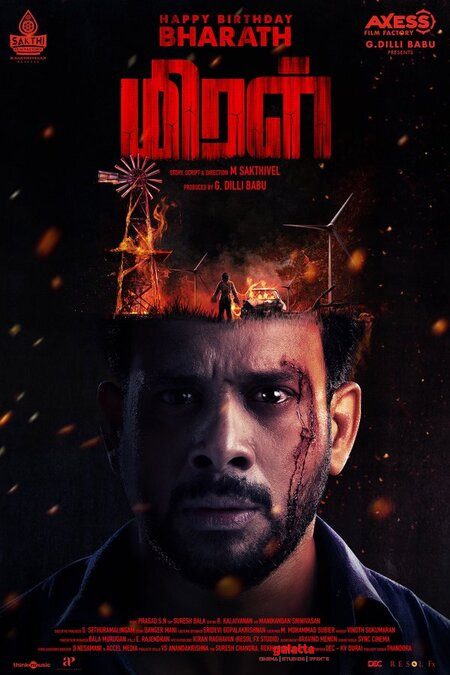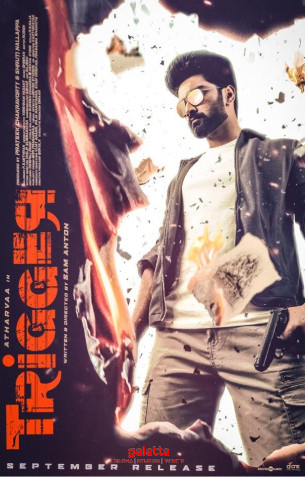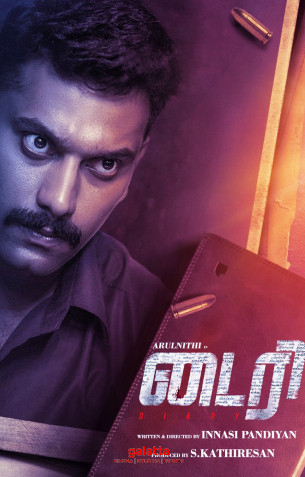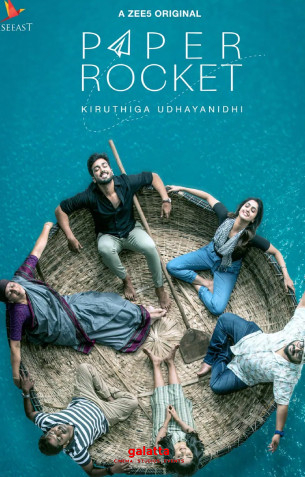Maamannan Movie Cast & Crew
Mari Selvaraj pulls off a stunning character arc in the first half of his third feature, Maamannan, which unfolds in Salem. Vadivelu gives a moving performance as the titular character – his weathered face carries the weight of the ages – and at the very start of the film, he is an MLA. When the title appears, AR Rahman unleashes the kind of fanfare befitting a king. In other words, we are not in a movie where someone from an oppressed caste has to work his way up from a nobody in the party, and reach a high position during a triumphant interval block or a triumphant climax portion. Maamannan, right from the beginning, is wearing the same colour – white – as the politicians from the dominant caste. He has already "arrived", so to speak, and some of us may wonder what's left for the film to do. If Karnan's village already has a bus stop, if Pariyan is already accepted as an equal in his law college, what is going to fuel the rest of the narrative?
And that's when Mari pulls off that arc. At first, when reminded about a dominant-caste event, Maamannan simply says: "Let us mind our own business. We have so much to do." At that point, I simply thought that his philosophy was to ignore provocations and do what needs to be done for the betterment of his people. A little later, when students rise as he enters the room, Maamannan asks them to remain seated. "You must learn not to stand up in front of others," he tells them. But when it comes to Rathnavelu (Fahadh Faasil), who is the son of the man who gave Maamannan a party position, he himself hesitates to sit. And that's when we realise the wonderful and very human contradiction in Maamannan: with everyone else, he is an equal, but when it comes to his "masters", his slave mentality comes out. Eventually, he says, he thought his position was given to him as alms, as though he were a beggar. It never occurred to him that it was his right.
And this is why Maamannan’s son Athiveeran won't talk to him. (Athiveeran is played by Udhayanidhi Stalin, whose grimness is enough to carry the character through.) This father-son relationship is extrapolated to the film's crux. With the dominant castes, the son (i.e. Rathnavelu) wants to follow his father's system of dominance. With the oppressed castes, there is a conflict between the old and new generations, and someone like Athiveeran cannot digest his father's servile nature. This climaxes in a superb interval point that Shakespeare may have summarised thus: "To sit or not to sit, that is the question". Athiveeran gets another beautiful scene where he barges into the Chief Minister's office. It's for a similar reason, and you can actually feel the character's angst that his father should not be pulled back to the old ways. Indeed, Maamannan's election campaign is saved by the new technology of a new generation. "If you won't let us enter your towns and villages, then we will beam ourselves as virtual presences and deliver our message." It's powerful. It’s brilliant.
Maamannan has many brilliantly dramatic scenes, but it also has scenes that keep us at an arm's length – because the characters are used to convey important things but don't seem to have much of an inner life otherwise. They remain ideological constructs. I would have loved to know, for instance, what happened after Rathnavelu's wife prevented him from doing something. Did he blow up at her? Did he calm down and understand that what she did was for his own good? The wife's name is Jothi, and we recall Pariyerum Perumal, whose heroine was named Jothi. There is a case to be made that an intra- or inter-linked Mari Cinematic Universe (MCU) exists, if not with characters then at least thematically. All three films are very specific about timelines: 2005, before 1997, and 2021 here. All three films have this floating-camera cinematographic style: if you focus on just the centre of the frame, it looks like a static shot, but look at the edges of the screen and you will see a very mild movement. (Theni Eswar is the brilliant cinematographer here.)
Then we have the signature cross-cutting, which I think comes from both the screenplay and the editing. This is not the typical back-and-forth between parallel events, but almost like a montage that gives us a bigger picture of a life beyond the immediate event on screen. See, for instance, Athiveeran picking up a stick to fight, and the cut to him dancing with his students in a black-and-white stretch. Or the surreal flashback-like sequence where a man from the past appears like a spirit, with the advice that wars should not be fought with the feeling of enmity. And then there is the seething rage, which Pariyan felt, which Karnan felt, and which Athiveeran feels, and which Mari probably felt or still feels. These are angry protagonists. And then, of course, we have the animals. In Pariyerum Perumal, the protagonist's spirit-animal was the dog, Karuppi. I felt Karnan went overboard with this symbolism, with a literal zoo of creatures, when the protagonist's spirit-animal is just the donkey.
But here, this symbolism is focused and also a little different, in the sense that both the protagonist and the antagonist get a spirit-animal. Rathnavelu is represented by the dogs he trains, which he compares the oppressed castes to, and which he doesn't hesitate to shoot. Athiveeran, meanwhile, is represented by the pig. Nagraj Manjule has already used this animal as a symbol in his gut-wrenching debut, Fandry: the title means "pig". And closer home, we have another marvellous directorial debut, Thamizh's Seththumaan: again, the title means "pig". And both films established an important fact: like with humans, there’s apparently a hierarchy with animals, too – and pigs are the lowest of the low because they wallow in waste. But Athiveeran is not ashamed. He rears pigs and advertises this "lowly" animal as a symbol of pride, with a very visible tattoo. And he dreams of pigs with wings that can escape their earthly chains. Most importantly, a piglet survives a massacre: it becomes a symbol that no one can eradicate an entire "race".
Mari’s ideas are brilliant but they are not always matched by the writing. You get the feeling he is in a hurry to race to the end of the screenplay, without wanting a “stay” at certain points. You feel this especially in the second half. This is when we get into an election race, which turns out to be very predictable. You could say this even of Karnan, where there was no doubt that the hero was going to come back, kill the villain, and save the village. But that film had other layers. It had mythological references and local gods and the backdrop of a big tragedy. The election portions in Maamannan play out like the elections we have seen in many films, with television debaters doing a lot of spoon-feeding about things we have already seen and grasped. There is no ambiguity that needs to be "explained", so these TV segments come off like repetition – and Mari Selvaraj does like to hammer home his points, even visually. In a scene where violence erupts outside a house, a camera focus-change reveals a peaceful Buddha statue inside the house. When we get a line like "Oru naal-la ellaathayum maatha paakariya?", I wondered why the villain wasn't written with more nuance. The character comes alive not because of the writing, but through Fahadh's scorching intensity, which transcends the one-note villainy.
Rahman’s score is bombastic, befitting the broad nature of Maamannan. I couldn’t help thinking back to Santhosh Narayanan's minimalistic score for the more subtly made Pariyerum Perumal, where even the death of Karuppi was highlighted with just acoustic guitars. But there’s no doubting the fact that Rahman delivers a blistering album: the songs fit beautifully. 'Utchanthala' is a heart-rending lament after a particularly gruesome tragedy. The rousing 'Kodi parakura kaalam' feels like an all-female version of Mari's favourite song, 'Poraadada' from Alai Osai, which was heard in both his earlier films. The song contains the phrase 'Oram po!', which may be a callback to the Ilaiyaraaja song that asked people to make way for the new.
Keerthy Suresh (as Leela) owns this number while dancing on stage, but she has little else to do. She is Athiveeran's staunch supporter, but given that she is also the love interest, I wished we had got a romantic scene or two. There is not much point to keeping Leela and Athiveeran apart for a bit before uniting them. At least, these scenes aren't very convincingly written. Like the love scenes in Karnan, they look like perfunctory placeholders for better moments that were either cut out due to length reasons, or remained unwritten, or were rejected because every scene, every shot, every line has to be weighted with Meaning. When a portion from 'Kallellaam manikka kal aaguma' plays on a radio, you wonder if it's just a song or if there's some significance to it – just like when Athiveeran asks his father to casually sing something and the man breaks to MGR's slave-emancipation number, 'Yaen endra kaelvi'. I wished for the Yogi Babu character from Pariyerum Perumal, who understood the gravity of the situation but also understood that not every minute has to be grave.
Athiveeran's martial arts school, Leela's coaching centre for the underprivileged, Athiveeran being taken in by a good man after he runs away from home, the reunion of Maamannan and his son, the stashed-away sickle and the gun – all these plot points have huge potential to draw us more into this universe, but they feel like missed opportunities. Even Maamannan’s win at the elections doesn’t give us a high. But I was tremendously moved by the fact that his wife is still terrified. She does not yet have the guts that her son already had and her husband has newly acquired. Change doesn’t come in a day. I love how Mari makes sure things are never one-sided. There are oppressed-caste people who resent the fact that an MLA's son rears pigs, and later, some of them take bribes to vote for the dominant-caste candidate. On the other hand, we have Leela, who belongs to a dominant caste ("sondhakaara ponnu," says Rathnavelu) and yet fights with Athiveeran for the oppressed.
I liked the touch that Leela is a very practical person and is always seen in very practical clothes, like T-shirts and shirts and jeans. I loved the touch of the election symbols. The dominant-caste symbol is a lantern. The oppressed-caste symbol is a star. One is an artificial "man-made" source of light, which gives illumination only to the owner; the other is natural, the way nature meant it to be, something whose light shines on everyone equally. There is the feeling that Maamannan could have been so much more. And yet, there is no denying that Mari Selvaraj’s third film is another solid outing. The shots of Maamannan and (later) Athiveeran confronting themselves in mirrors, the shots of centre-framed people on a hill looking down at the village, Yuga Bharathi’s powerful lyrics with punch-to-the-face phrases like ‘Koni saakkula surunda sanam’, the growth of Esakki from Thevar Magan as Maamannan here (even though he is first called ‘Mannu’, mud): there’s so much to take in, so much to unpack that the lack of emotional connect in places is replaced with an intellectual connect. Let’s hope Mari Selvaraj’s next outing has both in equal measure.
